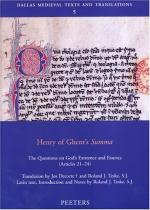|
This section contains 2,322 words (approx. 8 pages at 300 words per page) |

|
It will avoid misunderstanding if the topic of essence and existence is expounded in an order other than chronological.
Seventeenth-Century View
Thomas Hobbes and John Locke insisted that definitions are not of things but of names. In so doing, they conceived of themselves as breaking with Aristotelianism. Hobbes said that the essence of a thing is "that accident for which we give a certain name to a body, or the accident which denominates its subject"; he had earlier denied that "the definition is the essence of any thing"; and his example of an essence is that "extension is the essence of a body" (De Corpore, II, 8, 23).
Locke distinguished the real essence from the nominal essence; the nominal essence is the idea of the property or properties the possession of which justifies the application of a given name; the real essence is as it is...
|
This section contains 2,322 words (approx. 8 pages at 300 words per page) |

|


